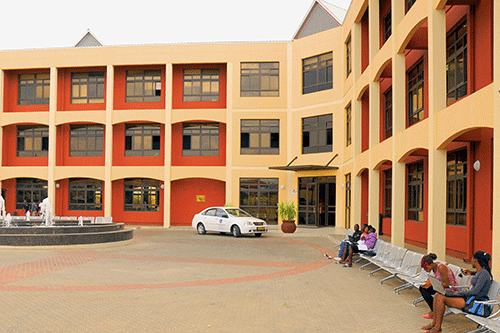While government and educationalists are still trying to get to terms with the recent disastrous matriculation examination results, the International University of Management has moved swiftly to capitalise on the thousands who failed to qualify for university acceptance.
IUM set up a tutorial centre to assist grade 11 and 12 learners who did not manage to get 25 points to upgrade their marks so that they can qualify to join a tertiary institution of their choice.
This comes after the grade 11 Namibia Senior Secondary Certificate Ordinary and grade 12 Advanced Subsidiary levels (NSSCO and NSSCAS) results show that only 8 133 pupils, or 24%, qualified for tertiary education from the 38 019 candidates who sat for the 2022 national exams.
Announcing the results last week, education minister Anna Nghipondoka expressed disappointment with the performance of learners in the newly introduced advanced subsidiary level.
Nghipondoka blamed the high failure rate of many learners due to a lack of teaching in the classrooms.
In an interview yesterday, the IUM director for marketing and communications, Gerry Munyama, explained the tutorial centre will help to address the problem the country is currently facing – a big number of learners who are stranded to move forward with their education.
“With this arrangement, we believe, this will help the learners to master how to study and improve, especially their English language proficiency,” Munyama said.
IUM received applications from 6 000 prospective students – from inside and outside Namibia.
Out of the 6 000, about 4 300 were provisionally accepted but the exact number of students who will join the university will be determined when registration starts in February.
Asked about the financial impact on the university due to this high failure rate, Munyama said IUM is a people’s university and its priority is to serve the nation’s educational needs and is, thus, not a profit-centred institution.
“Similarly, we are following with keen interest the debate and sentiments being expressed in our society from various corners of our society on the matter. It is not because, as you may imply of a negative effect on the new academic enrolment number of students, it may have for the university, but simply because as a responsible corporate citizen, we are worried about the future of our youth and thus greatly sympathise with our learners, their parents and our crying nation at this regrettable state of affairs,” he noted.
However, he admitted the largest proportion of any university, including IUM’s intake in any academic year, are students from the Namibian secondary schools, NSSCO/AS, meaning from grades 11 and 12, who write the same exams.
According to him, IUM is already hard at work, engaging the relevant stakeholders on how best we can serve our students who might find themselves in the streets.
He announced the university management will next week deliberate on various proposals that will help the students achieve their educational or carrier goals.
Munyama stated that the IUM management has, with the greatest concern, taken note – like any other responsible institution – of the high failure rate of the NSSCO/ AS learners.
Therefore, he says, given that the final admission to the university is dependent on the passing of the NSSCO/AS, the high failure rate means students who wish to further their studies at universities do not qualify for admission into degree programmes; hence, they would require a minimum of 25 points in five best subjects.
“However, I’m pleased to inform you that students who did not meet the degree requirements may qualify for non-degree programmes (certificates and diplomas), which require less than 25 points. IUM’s certificate and diploma programmes have clear articulation routes that allow a student to eventually enter into degree programmes at any other institution of their choice,” he mentioned.
Meanwhile, the University of Namibia (Unam) received applications from more than 19 000 prospective students, including those from outside the country.
Unam’s assistant director of corporate engagement Shahid Dickson said the applications that were received are from learners holding the new and legacy grade 12 qualifications.
According to him, a full analysis of the individual AS results is required to fully understand the impact of the results on tertiary admission.
“However, it is likely that the almost 9% increase in upgraded subjects at the NCCSAS level may have a slightly negative effect on the number of students to be admitted to Unam,” he indicated.
Unam is adamant that admitting large numbers of students who are not adequately prepared for university studies has far more serious financial implications than admitting fewer students with a reasonable chance of completing their degrees in the minimum time.
As in the past, the most popular programmes at Unam that received the majority of student applications remain education, nursing and management sciences.


